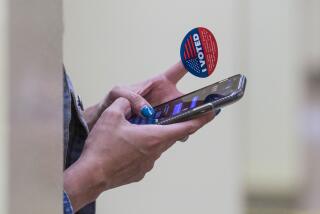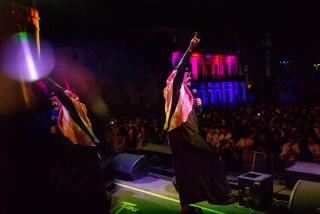Carnival on Democracy Street Gives Kuwait Hope : Elections: The oil-rich emirate’s voters wander from tent to tent as politicians make their pitches. Monday’s vote for a National Assembly is the first since the war.
- Share via
KUWAIT CITY — It was a typical night on Democracy Street, a sandy boulevard flanked by garish neon, a dozen election tents and dinner buffets ranging from camel meat to lamb kebabs. Through it all, thousands of white-robed Kuwaitis wandered tent to tent in search of truth, a good meal and a taste of the real issues behind Monday’s crucial legislative elections, the first real test of democracy in the land that half a million Americans fought to liberate 19 months ago.
On the surface, the carnival of democracy was vintage tribal politics, Kuwaiti-style.
The wealthy owner of the emirate’s Ford dealership, a veteran of Kuwait’s 1981 rubber-stamp National Assembly, held court in his air-conditioned, football-field-sized tent, slaughtering sheep out back for the dinner spread and doling out handshakes and the rhetoric of Kuwait’s ruling monarchs. There was even a “clown” candidate down the street, who drew curious onlookers with such quips as: “OK, give women the right to vote, but make their voting age 45. No woman will admit she’s over 45.”
But elsewhere along a street that analysts here call a microcosm of Kuwait’s emerging new democracy, extraordinary--almost revolutionary--things were happening:
An Islamic fundamentalist with engineering degrees from Southampton University in England and a Mercedes-Benz parked behind his tent lectured visitors on the urgent need to implement strict Islamic law in the emirate.
A few hundred yards away, a nuclear physicist with degrees from the University of Michigan sat barefoot and cross-legged, blasting Kuwait’s government for running away from the invading Iraqi army 26 months ago, yet carefully warning against any radical shake-up of “the system”--the monarchy that runs the nation.
And a veteran pro-democracy opposition leader at a nearby tent was denouncing not only the mistakes of Kuwait’s leaders but also the emirate’s mainstream democracy movement, which abandoned him when he challenged its adherence to old, pan-Arabist and anti-American policies.
As this tiny, oil-rich emirate goes to the polls to elect a new, 50-man National Assembly on Monday for the first time since the U.S.-led allied coalition freed Kuwait from Iraqi occupation, there are clear signs that this has already been the most free, fair and enlightened political exercise in Kuwait’s checkered march toward democracy.
The result of the voting--a contest between 275 largely wealthy, established candidates who have spent a reported total of as much as $250 million campaigning--will hardly be what Thomas Jefferson envisioned. It may not even be the exercise the Bush Administration had in mind when it pressed the Kuwaiti emir to answer national liberation with a national election.
Under Kuwait’s constitution, the assembly will have little real power.
The emir, Sheik Jabbar al Ahmed al Sabah, will remain Kuwait’s all-powerful head of state who will appoint the entire Cabinet. The emir’s cousin, Crown Prince Sheik Saad al Abdullah al Sabah, is likely to continue as prime minister with virtually unchallenged power to run the state’s day-to-day affairs, despite many pre-election calls for the two posts to be separated. And the powers of the assembly--most of whose members are expected to be either middle-of-the-road pro-monarchists or conservative Islamic fundamentalists--will largely be limited to approving contracts and attempting to be watchdogs of the royal government.
Women cannot vote Monday. Neither can more than 100,000 stateless tribespeople called bedoun . Political parties also are banned. Just 6% of the 1.2 million people who live in Kuwait are allowed to cast ballots, the result of a complex citizenship law.
The bottom line: Kuwait has an electorate of only 81,440 male voters, a group that one local political analyst recently was bold enough to denounce publicly as “our country club society.”
Yet that same analyst declared that Monday is “the most critical date in our nation’s history--a litmus test for our future and a watershed for democracy in Kuwait and the region.”
“Oct. 5 will determine how much we learned from the invasion and the crisis we went through,” said Abdullah Shayeji, a political science professor at Kuwait University who arranged a series of precedent-setting public debates during the campaign.
“You really have to appreciate this exercise in the context of Kuwait’s experience, in the context of its history and culture; and I believe what we have in Kuwait now already is unprecedented, in some ways unprecedented even for other societies.”
The candidates themselves--even the most anti-government ideologues who mercilessly questioned the performance of Kuwait’s royal family throughout the campaign--conceded that Kuwait’s first post-liberation election has already broken vast new democratic ground with implications for the entire Persian Gulf, a region still dominated by autocracies, dictatorships and ruling monarchies.
“The rhetoric . . . has been quite defiant, actually,” said candidate Khalid Sultan, an Islamic fundamentalist from one of the emirate’s wealthiest families.
And for analyst Shayeji, it is a message that will not be lost on Kuwait’s monarchical neighbors, regardless of the outcome of the vote.
“The Kuwaiti experience has been for a long time the model for the Middle East. I call Kuwait the California of the Gulf, because fads start here, and then they trickle down,” Shayeji said. “Of course, there’s a lot of fear in the region watching this. They do not want to radicalize or politicize their people, and they don’t want to see the Kuwaiti National Assembly as an inspiration that would pull the chair out from under their own monarchies.”
Monday’s elections will lay a foundation for democracy, which would evolve through laws made by the men who will occupy the emirate’s $60-million assembly building on the sea.
“Our constitution has lots of drawbacks, no doubt. Many changes have to be made,” said Mustapha Marafai, the nuclear physicist with the campaign tent on Democracy Street. “Still, we are afraid of asking for any major change at this point, because we are afraid if we open that door, it will lead us backward.”
By saying “backward,” Marafai was referring to two occasions in the past when the emir dissolved the assembly after it grew too critical of the system that has ruled Kuwait since the Sabah family claimed it out of the desert in the early 1700s. The most recent dissolution was in 1986.
Marafai is among the many who have warned about a strong showing by the Islamic fundamentalists, which would be a direct result of the key role fundamentalists played in the Kuwaiti resistance during the seven months of Iraqi occupation.
Fundamentalist candidates, backed by what are called political “groupings” rather than “parties,” have vowed to join forces in the next assembly to replace the emirate’s Napoleonic penal system with strict Islamic law similar to that in neighboring Saudi Arabia, where criminals routinely are sentenced to floggings, amputations and public hanging by religious courts.
Yet even the fundamentalists have been careful to advocate a conservative approach to change on all the key issues, ranging from women’s suffrage and Islamic law to consitutional amendments that ultimately could turn the monarchs into British-style figureheads.
“To move from an uncivilized society--from the feudal, tribal system--to a real democracy, there is a mechanism. It took the British seven centuries to make that transition,” Ismil Shatti, leader of a fundamentalist political group called the Islamic Constitutional Movement, told a gathering recently.
More to Read
Sign up for Essential California
The most important California stories and recommendations in your inbox every morning.
You may occasionally receive promotional content from the Los Angeles Times.










